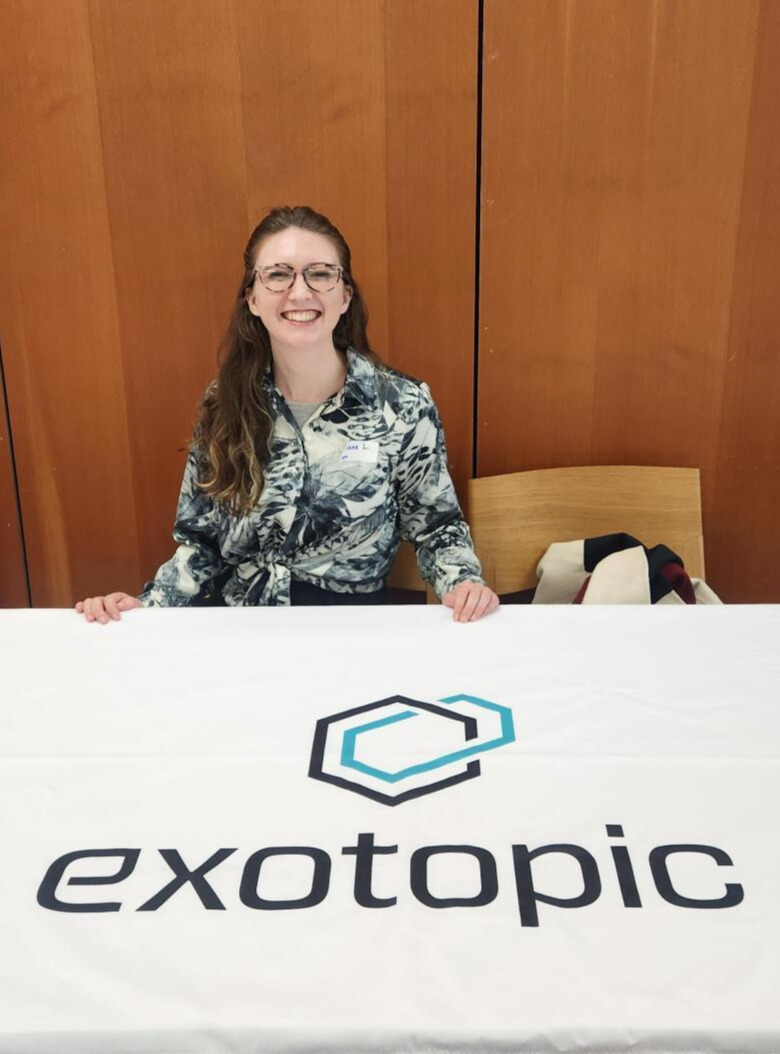Madeleine Landell
MSc in Astrobiology and Planetary Sciences
Why did you decide to study at the University of Edinburgh?
This programme stood out to me and looked promising, particularly because The University of Edinburgh is home to the UK Centre for Astrobiology. It was the programme itself that brought me to Edinburgh. I had initially spoken to Sean McMahon, one of the Programme Directors for the MSc Astrobiology and Planetary Science programme, he told me the programme was in development and so in 2022 I submitted my application to become part of the first cohort of the Astrobiology programme. I was also keen to live in the UK, and Edinburgh is such a beautiful city and having visited before as a tourist, I was excited about moving here.
What is your current role?
I’m a Graduate Consultant at a company called Exotopic and I work mostly consulting with space businesses. Exotopic focuses its attention on a lot of different areas. They run technical expert support for businesses, particularly related to satellite applications such as Earth observation or launch and they have a team of experts that can help them with technical questions related to their new technology, products, or even networking business plans. Another thing they do is engage with investors in the UK and raise the profile of the UK space sector as an investible area.
Something I’ve been enjoying about the job is getting to explore the business side of the space industry. My degree was quite technical whereas my current role focuses on satellite applications, which is where a lot of the commercial space action is. Exotopic works on a lot more than just the commercial side, like running student rocketry competitions and working with the government on different projects, so it's definitely fun.
How did you get where you are?
I always knew I wanted to work in the space sector. With that goal in mind, I focused on improving my networking skills and making the most of platforms like LinkedIn as well as going to in-person events and conferences. I signed up for classes like Industry and Entrepreneurship in Biotechnology, which taught me about business plans and the business side of science start-ups.
I got my current job through attending a University of Edinburgh event. UKSEDS, UK’s national student space society, had organised an entrepreneurship conference. It was there where I attended a talk by Jodie Faitakis from Entrepreneurial Spark, where she discussed supporting start-ups in the UK, particularly in the space sector. I found the topic so fascinating that afterward, I approached Jodie and told her how interested I was to learn more of the business side of the space sector. She was supportive and even put me in touch with the Principal Investigator for Exotopic. From there, I had a few Teams calls, and later that summer, I got the job!
What did you gain from your time at the University? What experiences helped prepare you for life after graduation?
My time at university was key in helping me build the hard skills I needed for the space sector. The classes on remote sensing gave the basics on how satellites work and the various ways they are used. The astrobiology courses taught me how space missions are set up as well as the global network of organisations and partnerships in making them happen. Learning how the relationships between academia, industry, and manufacturing form the foundation of so much of the work in this field was also valuable.
The extra curriculum activities I was involved in helped too. Some classmates and I ran a space society, where we organised events like helping the Scouts of Scotland launch a small rocket. Experiences like that taught me how to plan events, engage with people, and do outreach in the community. On the consulting side of Exotopic, it’s not just about being able to do the research; it’s also about connecting with people, organising events, and building those key relationships. University is definitely an environment where the more you put into it, the more you get out of it.
Do you have any highlights of your time at the School of Physics and Astronomy?
One of the highlights has been getting to connect with the UK Centre for Astrobiology, particularly with the PhD students, postdocs, and even the lecturers running our programme, which I think is quite unique to being part of a small cohort.
Outside of classes, I loved living at Ascham Court in Newington, which is really close to the University’s main campus, there were so many fun cultural events and different outings like museum trips and movie nights. As a master’s student, you’re only here for a short time, so it was amazing to meet others having similar experiences and connect with the community. Living on campus was a huge perk—there was always something happening and never a dull moment.
What advice would you give to new students?
What worked for me was pacing myself and not putting too much pressure on myself either to avoid burnout. I would also say, showing up to class made a big difference. I’d tell myself I’d watch recordings later, but I never did.
The university’s disability services were also a huge support. As someone with ADHD, their support—like helping me plan assignments—was essential, especially since I couldn’t access my usual medication here like I can do in North America. That support helped get me through the year.

